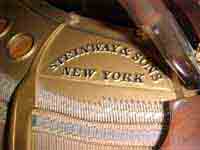|
IS there a future for the piano?
There is no future if people stop playing the piano because they satisfy their needs for music some other way. Every home in all the world has music, but very few have a piano. We have to work hard to foster more than appreciation for the piano. Then next generation must cherish it as we do, or it will go the way of the harpsichord, reed organ, Edsel, and Saturn.
There are many aspects to our job of fostering these values. We must start to identify them, and see if there are any that we have the power to address. For example, maybe we can't change how changes in the world economy has caused a shift in piano production to other countries; but we can encourage our community to attend and support arts events that use pianos; schools, churches, and other institutions to have and use them; promote events that bring friends together around the piano; and encourage families to use the piano to interact with each other and build memories. We must be very good marketers in competition with many distractions to everyone's time and resources. If we are successful, pianos will continue to have a role in families and communities for generations to come.
Our job as teachers, parents, and community members is not to produce a few elite performers and a cadre of consumers. We must help everyone want to have a piano and play it. That will only happen if the piano meets their needs, especially the need for social interaction.
...gimme a Winchester rifle and a whole box of shells
blow the roof off the goat barn
let it roll down the hill
the piano is firewood
times square is a dream
I find we'll lay down together in the cold cold ground
cold cold ground
cold cold ground...
(Tom Waits "Cold Cold Ground")
(Tom is best known for "The Piano Has Been Drinking (Not Me)")
|
Historical Perspectives
Four hundred years of tradition did not protect the harpsichord when the piano finally became popular. By 1816 the Paris Conservatory was using harpsichords for firewood.
Reed organs were manufactured in great numbers after about 1830. Demand decreased with competition from cheap upright pianos. They evolved with developments in electric motors and electronic amplification. Electronic organs completely replaced them in the 1920's and 30's.
Edsel was touted as the future of the auto by Ford. In 1956 it was the second largest car launch to date. Three years later Ford announced the end of the Edsel program, but continued making them and losing millions.
I was at the Saturn dealer for repairs soon after the announcement of their demise in 2009. They still had signs all over claiming Saturn to be the future of American car manufacturing.
|
 Someone once asked
a piano tuner if he thought he might tune pianos in heaven. Certainly
music must play a part in heaven. Angel choirs announced the birth
of Christ. But if there are pianos, what would they be like? C.P.E.
Bach would have expected a tiny rectangular, clavichord-like instrument.
Chopin would have hoped for a sweet, smooth Pleyel. Beethoven
might have liked anything that would hold together and play loud
enough to hear. A modern artist might think it heavenly to play
a celestial sized concert grand that could be heard as thunder
around the world. The humble tuner would just hope that parts
were still available. The player today would do well to keep in
mind that keyboard music of the 18th and 19th Century was written
for quite a different instrument than Is generally built today
and adjust playing accordingly.
Someone once asked
a piano tuner if he thought he might tune pianos in heaven. Certainly
music must play a part in heaven. Angel choirs announced the birth
of Christ. But if there are pianos, what would they be like? C.P.E.
Bach would have expected a tiny rectangular, clavichord-like instrument.
Chopin would have hoped for a sweet, smooth Pleyel. Beethoven
might have liked anything that would hold together and play loud
enough to hear. A modern artist might think it heavenly to play
a celestial sized concert grand that could be heard as thunder
around the world. The humble tuner would just hope that parts
were still available. The player today would do well to keep in
mind that keyboard music of the 18th and 19th Century was written
for quite a different instrument than Is generally built today
and adjust playing accordingly.